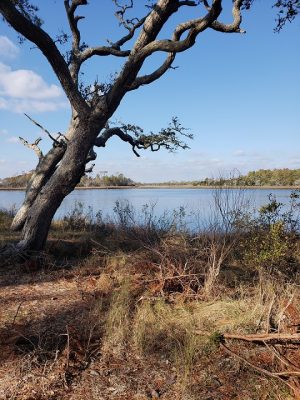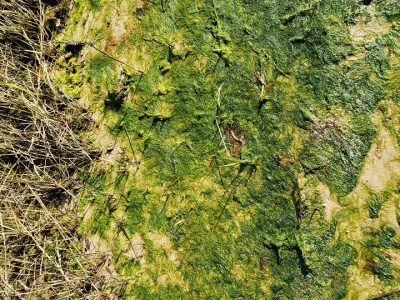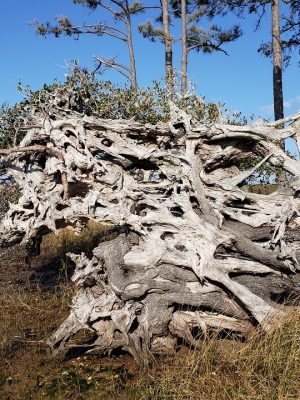
Reprinted with permission from the Carteret County News-Times
CEDAR POINT — The North Carolina Clean Water Management Trust Fund awarded the town a $1,011,756 grant Friday to help pay for 56 acres it purchased in April for a park on the White Oak River.
Supporter Spotlight
The town worked with the North Carolina Coastal Federation to get the grant from the state organization, which gives nonprofits and local governments money for projects and acquisitions that protect or enhance water quality.
The Cedar Point grant was one of the largest of the 34 the Clean Water Management Trust Fund board approved in a 2019 package that totaled more than $14 million.
The state Clean Water Management Trust Fund was established by the state General Assembly in 1996 as a nonregulatory organization. It receives money from annual appropriations by the legislature and the sale of scenic river license plates.
Mayor Scott Hatsell said Saturday he was “floored” when he got the news.
“I’ve always thought this project was deserving, and it helped to have the Coastal Federation working with us,” he said. “But you never know what the people who control this money are thinking, what they think is worthy. Evidently they were thinking right, and we’re very grateful.
Supporter Spotlight
“I’m excited, really pumped, and so is Jayne (Calhoun, town clerk and interim town administrator who worked on the grant application),” Hatsell, an avid kayaker and hiker, added. “We really want to get the water (adjacent to the property) cleaned up the best we can.”
Already, the mayor said, he’d reached out to Todd Miller, founder and executive director of the Coastal Federation, for a list of things to do – like planting oysters and creating living shorelines – that will help in that effort.
Hatsell knows these projects can work and cited the city of Jacksonville, which has worked for many years to clean up the New River.
On Jacksonville’s Facebook page, officials state that the river was so polluted in 1995 that a “massive hog waste spill did not have significant negative effects because the river was so organically dead.”
Jacksonville officials, scientists and volunteers led efforts to restore the New River with water-filtering oysters, aeration, bolstered wetlands and stormwater mitigation efforts. Now it’s a magnet for fishing and other water-based recreational activities.
Hatsell said the White Oak, adjacent to the town’s property, isn’t nearly as bad off as the New River was, but there’s room for improvement.

He and other town officials have stressed the purchase was intended not just for a park, but also to maintain and possibly improve water quality in the river.
The Cedar Point grant is listed on the Clean Water Management Trust Fund website as a “military buffer” acquisition project, because the town’s purchase of the land off Masonic Avenue will preclude development of the property, which is within the flight path of jets that use Bogue Field, an auxiliary landing facility for U.S. Marine Corps Air Station Cherry Point in Havelock. Bogue Field, in the town of Bogue, is 2.6 miles east of Cedar Point on N.C. 24.
The land had been zoned for multi-family development, which could have put residents at risk if a jet crash occurred.
It also would have dramatically increased impervious surface, which would have increased the flow of polluted stormwater into the river.
The town closed on the $2.8 million purchase from the North Carolina Masons after a more than yearlong process that led first to a successful $2.5 million bond referendum.
A 3-cent property tax increase, from 6.25 to 9.25 cents per $100 of assessed value, went into effect July 1 to help pay for the purchase.
Town officials told residents they would try to use grant money to reduce or eliminate the tax increase, which had to go into effect before the fate of the Clean Water Management Trust Fund grant application was known.
The town already received one grant for $250,000 from the North Carolina Coastal Land Trust, and used that money as a down payment on the purchase, reducing the amount borrowed. The town has also applied for a $500,000 grant from the North Carolina Parks and Recreation Trust Fund and should get word on that soon. That money could be used for park development.
Sterling National Bank of New York bought the bonds, and the town is scheduled to pay the bank back over no more than 20 years with four payments each year.
Hatsell said he knows property owners in town will expect some kind of a tax decrease next fiscal year and he’s convinced it can be done.
The bank that bought the bonds allows two “buy-downs,” he said, “and you want to make sure that when you do that, it’s a big chunk of money.”

The land is to be used mostly as a passive recreation area. It has existing trails, which the town has already marked, and a master plan developed for the town by The Wooten Co., a Raleigh-based engineering and planning firm, calls for an entrance off Masonic Avenue.
Other planned improvements include a parking lot with a restroom and shelter, paved and natural trails, a nature play area, three water view platforms, a fishing pier, a kayak and canoe launch with a drop-off area away from the water, a single-stall waterless bathroom closer to the water, a bench, swing and hammock area close to the shore, an open space events lawn, a picnic area and a living shoreline to protect against erosion.
There are also proposals for a kayak and canoe storage area, boardwalks, an outdoor classroom and shelter, a pond and a vegetative buffer between the park and nearby residences. Wetlands, which are scattered through the site, will be protected, and the project is designed to comply with the Americans with Disabilities Act.
None of this will happen right away.
The goal for now is to get the natural trails open to the public. Hurricane Florence in September 2018 downed many large trees and left other trees with dangling branches. The town hired a contractor to remove the trees and branches.
Hatsell said Saturday the town is “getting really close” to opening the land to the public.







